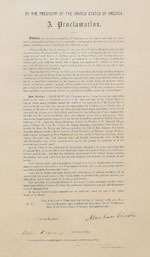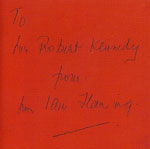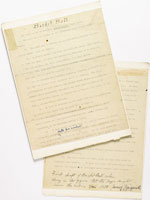 Ian McKay’s weekly column in Antiques Trade Gazette has been running for more than 30 years.
Ian McKay’s weekly column in Antiques Trade Gazette has been running for more than 30 years. Manuscripts to Movie Scripts
Kennedy Connection
The Kennedy-Lincoln Emancipation Proclamation, $3,778,500 at Sotheby’s New York on December 10, and Robert Kennedy’s inscribed copy of The Spy Who Loved Me, $46,360 at Bonhams New York on December 9.
Robert (Bobby) Kennedy’s copy of the famous ‘authorized edition’ of Abraham Lincoln’s Emancipation Proclamation, was one of just forty-eight broadside copies printed in 1864 and put up for sale at a Philadelphia fair organized by the United States Sanitary Commission.
Formed three years earlier to assist sick and wounded Union soldiers and their dependants, the Commission was almost entirely dependent on private funding for its work and its most successful source of income was the series of fairs at which a huge range of donated goods, old and new, were sold.
Lincoln often donated autograph material and even gave the autograph draft of his Emancipation Proclamation to a Chicago fair of 1863. Bought by Thomas W. Bray and donated to the Chicago Soldiers Home, it was lost in the great Chicago fire of 1871.
At the 1864 Philadelphia fair, sales of a specially printed and signed edition of the proclamation contributed towards the $1 million raised, but of those forty-eight copies, only twenty-six are now recorded, most in institutional collections.
None of those in private hands has such an evocative provenance as this example offered at Sotheby’s, acquired by Bobby Kennedy for $9,500 at a 1964 Parke-Bernet sale. Until his widow sold the family home at Hickory Hill last year, it held pride of place among his manuscripts, hanging between his own appointment as attorney general and a privately printed broadside edition of his brother’s inaugural address.
Sent for sale at Bonhams from the estate of Paul ‘Red’ Fay, a close family friend of the Kennedys and sometime advisor to JFK, was a 1962 first of The Spy Who Loved Me that 007’s creator, Ian Fleming, had inscribed to Bobby Kennedy.
The Birth of “Basket Ball”
James Naismith’s original typescript “Basket Ball rules,” $4,338,500 at Sotheby’s New York on December 10.
A physical education teacher at the YMCA Training College in Springfield, Massachusetts, who later became both a Presbyterian minister and a doctor, Naismith was among that body of men that we once used to call ‘muscular Christians’—those who believed that physical fitness was an imperative part of spiritual health.
In England, such men were instrumental in popularizing mountain climbing, but Naismith faced a different challenge. He needed to find an energetic team game that could be played indoors, and the game he came up with—something totally new, something that had not evolved from earlier sports—became one of the world’s more popular team sports.
The two sheets of paper pictured here are those on which, on a December day in 1891, he first typed out the thirteen rules of his game. As the illustration shows, Naismith called his game Basket Ball, and that two-word form remained in use until 1921.
The rules were sold by the Naismith family, and the proceeds of the sale will go towards funding work with underprivileged children undertaken by the Naismith International Basketball Foundation. The buyers were David and Suzanne Booth, who hope to bring the rules to the University of Kansas. Mr. Booth is an alumnus of the University of Kansas, and he and his wife were inspired to bid by lifelong Kansas basketball fan, Josh Swade.
Naismith, who spent the last forty-one years of his life in Kansas, brought the game he had invented to the state in 1898, coaching Forrest ‘Phog’ Allen, who in his turn came to be known as the ‘Father of Basketball Coaching.’










